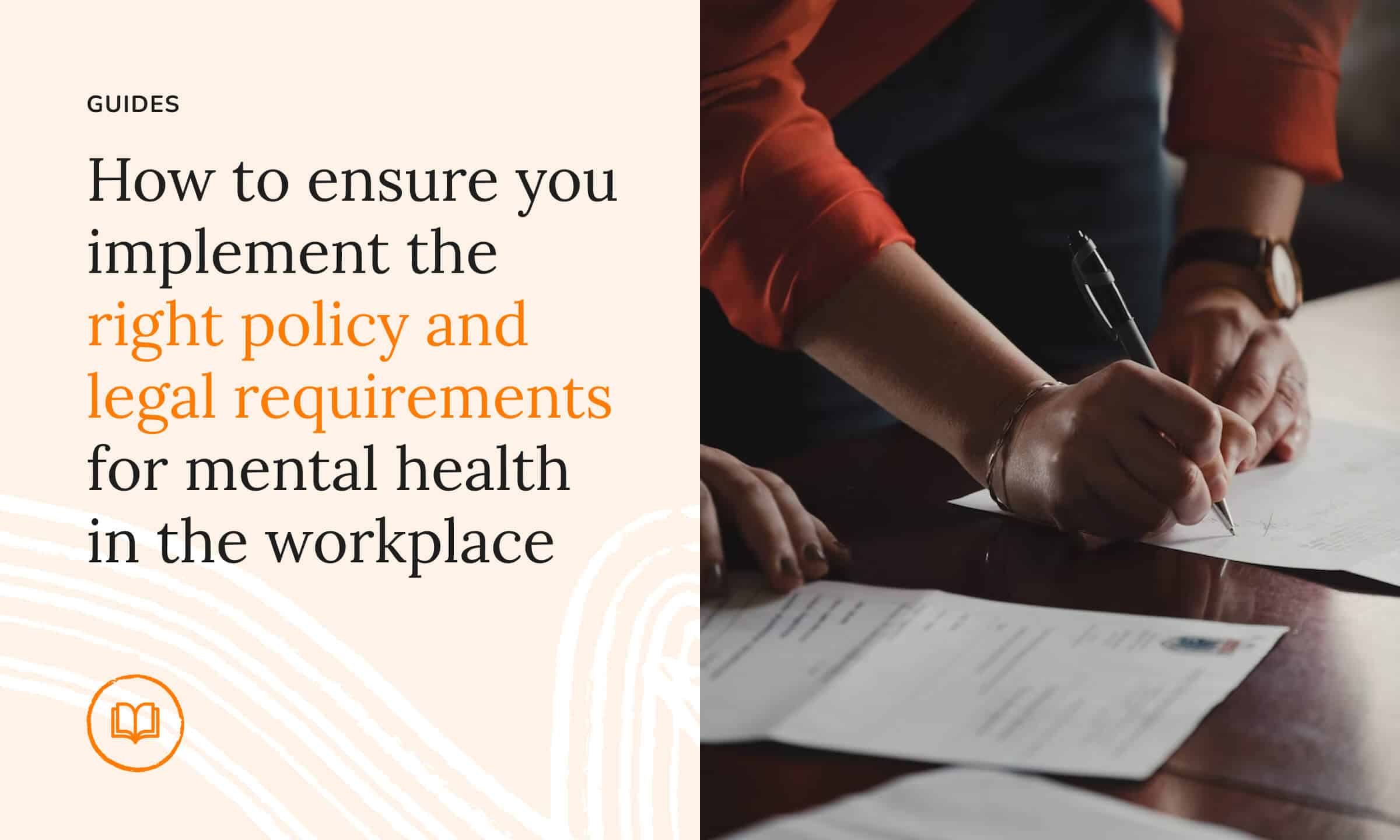Much as we love our colleagues in the legal department, we might not want to talk to them… It’s never a good day at work when you’re in trouble with the legal department, or get an URGENT request for a meeting. That makes it crucial that we understand the legal requirements that face us in our day-to-day work lives.
And depending upon where in the world you’re working, there are lots of different legal requirements about mental health in the workplace. But fear not – you don’t nervously have to ask legal. (They have enough to do, after all.) We’re breaking it all down for you now. Let’s get started!

Mental health is an important aspect of overall well-being, and it is important for employers to provide a supportive and safe work environment for employees. In addition, employers are legally required to meet certain standards for mental health in the workplace. In this guide, we’ll explore your legal and ethical responsibilities for protecting employee mental health.
What does the law require employers to do regarding mental health?
Laws and policies related to mental health in the workplace vary globally, but all have the common goal of protecting employees’ well-being and promoting a supportive work environment.
In the United Kingdom, the Equality Act 2010 requires employers to make reasonable adjustments for employees with disabilities, including mental health conditions, and prohibits discrimination based on disability.
In the European Union, the Framework Directive 89/391/EEC on the introduction of measures to encourage improvements in the safety and health of workers at work requires employers to assess and manage risks to health, including mental health, in the workplace.
In the United States, the Americans with Disabilities Act (ADA) prohibits discrimination against individuals with disabilities, including mental health conditions, in employment and requires employers to make reasonable accommodations for employees with disabilities.
Employers are expected to address potential mental health hazards, provide support for employees struggling with mental health issues, and prevent discrimination based on mental health.
In Australia, the Fair Work Act 2009 requires employers to provide a safe and healthy work environment, including addressing work-related stress and other mental health hazards. The Mental Health Commission of New South Wales also provides guidelines for promoting positive mental health in the workplace.
In Canada, the Canada Labour Code requires employers to take measures to protect the health and safety of employees, including their mental health, and provides for complaints to be made if employees feel that their mental health is being negatively impacted by their work.
While laws and policies regarding mental health in the workplace may vary by country, they all have the goal of promoting a safe and supportive work environment for employees. Employers are expected to address potential mental health hazards, provide support for employees struggling with mental health issues, and prevent discrimination based on mental health.
What duty of care are employers legally required to provide?
Employers have a legal duty of care to ensure that their employees are not subjected to harm, including harm to their mental health. This includes providing a safe working environment, addressing bullying and harassment, and offering support for employees who are struggling with mental health issues.
Do legal requirements for health and safety in the workplace also have to cover mental health?
Yes, mental health is considered a part of overall health and safety, and employers are required to address potential hazards to mental health in the workplace.
If an employee experiences harm as a result of an unhealthy work environment, the employer can be held liable for damages, including compensation for lost wages, medical expenses, and emotional distress.
What responsibilities do employers have around work-related stress?
Employers have a responsibility to assess and manage risks associated with work-related stress, including providing a supportive work environment, training for managers, and offering support for employees who are struggling with stress.
What are some examples of mental health discrimination at work?
Examples of mental health discrimination in the workplace include failure to make reasonable adjustments for employees with mental health conditions, exclusion from workplace activities, and harassment or bullying based on mental health.
Can employers be liable for creating a mentally unhealthy work environment?
Short answer: yes! This can occur if employers fail to address work-related stress, harassment, discrimination, and other factors that can negatively impact an employee’s mental health. Employers have legal requirements to provide a safe and healthy work environment, including taking steps to address and prevent mental health hazards in the workplace.
In some jurisdictions, such as the United Kingdom and Australia, employers have a duty of care to protect employees from work-related stress and other mental health hazards. In the United States, under the Americans with Disabilities Act (ADA), employers are required to provide reasonable accommodations for employees with disabilities, including mental health conditions, and must take steps to prevent discrimination based on disability.
In Canada, the Canada Labour Code requires employers to take measures to protect the health and safety of employees, including their mental health, and provides for complaints to be made if employees feel that their mental health is being negatively impacted by their work.
One of the best ways to implement a good mental health policy is to get the experts involved.
If an employee experiences harm as a result of an unhealthy work environment, the employer can be held liable for damages, including compensation for lost wages, medical expenses, and emotional distress.
How do I implement a good mental health policy at my company?
To implement a good mental health policy, it is important to involve employees, provide training for managers, and offer support for employees who are struggling with mental health issues. One of the best ways to implement a good mental health policy is to get the experts involved: that’s us!
nilo.health is committed to improving employee mental health in the workplace. Our platform offers resources and support for both employees and employers to create a mentally healthy workplace. With training, access to top global psychologists, HR insights and more, we can help you create the supportive company of your dreams. Book a demo today!







